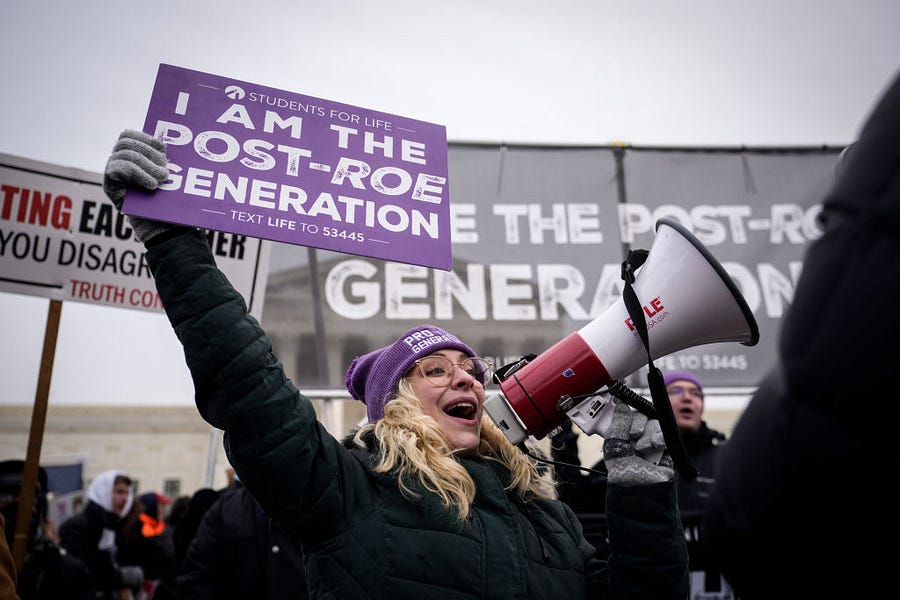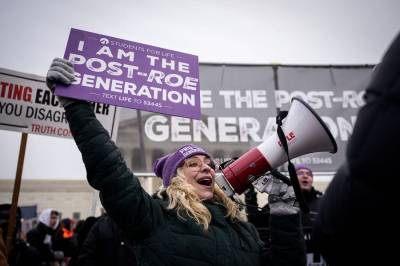In some respects, Friday’s March for Life—the annual antiabortion march from the National Mall to the Supreme Court in Washington, D.C., to mark the anniversary of Roe v. Wade—was an uncharacteristically muted affair. Blame the circumstances of the hour. The winter weather punishing the South this weekend, the Omicron surge that made hauling a few dozen high schoolers or parishioners across the country in a charter bus a more daunting than usual prospect, D.C.’s severe new COVID vaccine requirements to get into most indoor businesses—all these ensured fewer people would attend the march than have in past years.
But the thousands who came—they still came by the thousands—seemed determined to make up for their smaller numbers in sheer enthusiasm. They ballyhooed the speakers and threw themselves into their various hey-hey-ho-ho-style chants with abandon. You got the impression they didn’t have to try very hard to get there: For the pro-life movement, a major victory over America’s half-century-old abortion regime has never seemed so tantalizingly close.
This summer, the Supreme Court intends to reach a decision on Dobbs v. Jackson Women’s Health, the most direct challenge to Roe v. Wade since Casey v. Planned Parenthood in 1992. The case concerns a 2018 Mississippi law that would ban abortion in the state after 15 weeks’ gestation, with exceptions only to preserve the life of the mother or for severe fetal abnormality. After former President Donald Trump’s single term in office bore fruit in the form of three new SCOTUS justices, pro-lifers dare to dream that they may finally—finally—have the court they need to take a bite out of Roe.
“It amazes me—I never thought the day would come when Roe might actually be overturned,” former Rep. Dan Lipinski, a pro-life Democrat who served in Congress from 2005 until 2021 and who spoke at the rally Friday, told The Dispatch. “It just seemed for decades that the Supreme Court justices that were appointed and confirmed, that we thought things were going to change and that Roe might be overturned—[but then] we went through Casey in the early ‘90s. So I never thought we’d get to this point.”
So, despite obstacles, despite the January cold, here they were, marching. The advocacy group Students for Life, which for years has handed out “We Are the Pro-Life Generation” signs at events like this, had a new slogan on offer: “We are the Post-Roe Generation.” Another entity, the lay Catholic American Society for the Defense of Tradition, Family and Property, had volunteers stationed around the Mall, handing out pamphlets to the assembling throng: “The Day After: What Is Our Dream for a Post-Roe America?”
The crowd that assembles on the Mall every year is an unusual bunch, and the D.C. press never seems to know quite what to make of it. It was easy enough, during the Trump years, to write the thing off as the president’s closest-to-home mega-rally—but that always obscured just how little many of the marchers seem to care about politics in general. These aren’t members of the activist class, though the March does attract a patina of aspiring thinkfluencers and Congressional hopefuls. Sometimes there are weirdos of a darker sort.
Mostly, though, they’re high schoolers, college students, church groups, Knights of Columbus. At the rally before the March, they clap and cheer politely through a few politicians’ speeches and boo at the appropriate times when the talk turns to the Biden administration’s support for abortion rights—but they really get jazzed for the last speaker, a genuine celebrity: the vaguely Jon-Hammish Fr. Michael Schmitz, a Catholic priest and YouTuber who hosts the popular podcast Bible in a Year.
It's almost funny, watching a crowd like this bounce off the ordinary trappings of Mall activity—street-sellers loaded for bear with LET’S GO BRANDON hats and other assorted GOP lifestyle swag, but who didn’t do much business. You could pick the occasional MAGA hat out of the crowd, but they were surprisingly rare—no larger a contingent than the few megaphone-wielding street preachers who always turn out for the March, apparently on the theory that they won’t get a better opportunity to yell at such a large concentration of Catholics at once. (One possible alternative read on the dearth of MAGA hats: They’re ball caps, and it was cold.)
Then there was the interesting subset of groups defining themselves in tension with the mainstream of the crowd, like the small cadre of leftist pro-life groups that hung to one side of the rally: Secular Pro-Life (banner tag line: “For the embryology textbook tells me so”), Rehumanize International (one demonstrative sign read “queer Latina feminist rape survivor against abortion”), and the Progressive Anti-Abortion Uprising (“divest from big abortion now!”)
What might life look like in a post-Roe America? Some marchers, leery of raising their own expectations, said that’s a bridge to be crossed when we come to it. Others made it clear they realize that, although Roe has been the primary target of the pro-life movement for nearly half a century, its dissolution doesn’t mean the movement’s war is won.
“My feeling is, you’ve got to have a plan,” former Sen. Rick Santorum, who attended the rally but did not speak, told The Dispatch. “I mean, the other side’s already passing laws in some of these blue states that are actually worse than Roe v. Wade. They’re actually constraining the pro-life movement and making abortion even more available than it would be. And seeing this side of the Biden administration that may be coming down the road—getting rid of conscience clause protections, mandating hospitals to perform abortions. These are the kinds of things that we’re gonna be dealing with in these blue states—it’s going to be great in some states, but it’s not going to be in others, and we’re gonna have to battle.”
“To me, I don’t think we march here anymore,” Santorum added. “I think we go to the state capitals and focus where the fight is.”
Nor, some pointed out, will the fight be only legislative.
“No matter what the laws say … even if they make it illegal, there’s always gonna be people who still want to access it,” said Avery May, a young rainbow-haired activist with Progressive Anti-Abortion Uprising. “It’s not going to be unthinkable for a very long time. It’s going to take a long time for our culture to actually catch up.”
The more you look at the March, the more you see that this point isn’t tangential to the proceedings. Easily the rally’s most moving speaker was Mikaela Kook, an undergraduate at George Mason University. A little more than a year prior, she told the crowd, she’d gotten pregnant and initially sought an abortion.
“I didn’t know what other choice I had, and I was scared. But I knew that I didn’t want to abort. I was lucky the staff there was very kind to me, and they let me come to my own conclusions, being supportive when I told them I didn’t want to go through.”
Things went from bad to worse for Kook, though. Her parents kicked her out of the house, so she couchsurfed with friends, trying to figure out how to keep attending school and how she would provide for her baby. It was a local crisis pregnancy center—Mary’s Shelter of Virginia—that helped get her back on her feet.
“I have to say it wasn’t easy,” she went on. “I was scared. I felt so alone for so long. So many times I considered giving up life entirely. Somehow, though, I managed to keep going, and I’m glad I did. My daughter, Amy, is my pride and joy of my life, and she is my source of determination.”
Whether Roe falls or not, that fight—to win the hearts and minds of mothers, especially those who don’t see an alternative to abortion—continues.
For March for Life attendees in particular, though, the fall of Roe could have one bonus benefit. Maybe, they laugh, they won’t have to march on a subzero January day anymore. Maybe they’ll have cause to commemorate another anniversary: Dobbs, after all, is supposed to be decided in June.






Please note that we at The Dispatch hold ourselves, our work, and our commenters to a higher standard than other places on the internet. We welcome comments that foster genuine debate or discussion—including comments critical of us or our work—but responses that include ad hominem attacks on fellow Dispatch members or are intended to stoke fear and anger may be moderated.
With your membership, you only have the ability to comment on The Morning Dispatch articles. Consider upgrading to join the conversation everywhere.